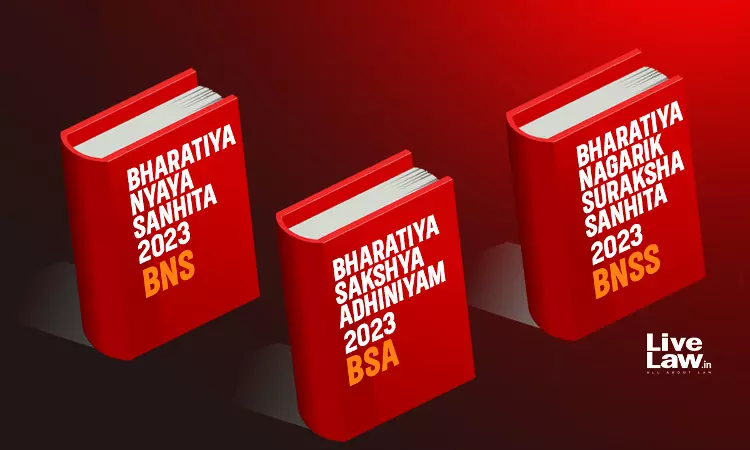- Home
- /
- High Courts
- /
- Madras High Court
- /
- Can A Law Be Challenged For Alleged...
Can A Law Be Challenged For Alleged Lack Of Discussion In Parliament? Madras High Court Asks In Plea Against New Criminal Laws
Upasana Sajeev
30 Oct 2025 1:55 PM IST
The Madras High Court on Thursday questioned whether the constitutional validity of a central legislation can be challenged on the ground that there was no proper deliberation or discussion in the Parliament, at the time of passing the law. The bench of Chief Justice Manindra Mohan Shrivastava and Justice G Arul Murugan was hearing a batch of pleas challenging the constitutional validity...
The Madras High Court on Thursday questioned whether the constitutional validity of a central legislation can be challenged on the ground that there was no proper deliberation or discussion in the Parliament, at the time of passing the law.
The bench of Chief Justice Manindra Mohan Shrivastava and Justice G Arul Murugan was hearing a batch of pleas challenging the constitutional validity of the new criminal laws, the Bharatiya Nyaya Sanhita, Bharatiya Nagarik Suraksha Sanhita, Bharatiya Sakshya Adhiniyam.
"How can you challenge the law stating that proper consultation was not done, our views were not considered or that discussion were not there. All these are not grounds for challenging legislative competence. You show us judgments where a law can be challenged on these grounds. Otherwise, we'll dismiss the pleas," the court orally remarked.
When the case was taken up last year, the bench of Justice SS Sundar (now retired) and Justice N Senthilkumar had questioned the need for bringing in the new laws and suggested that amendments could have been brought into the existing laws itself.
While the matter was pending, the parties had approached the Supreme Court seeking to transfer the case from the High Court to the Supreme Court. Considering that a High Court's view would be helpful, the Supreme Court bench impressed upon the petitioner to assist the High Court in the pending writ petitions, so it can have advantage of the High Court's opinion with respect to validity of the 3 central Acts.
The apex court had thus requested the High Court to give expeditious hearing to the pending writ petition. Following this, the cases were posted for hearing today.
Advocate Maheshwaran, appearing for the Federation of Bar Associations of Tamil Nadu and Puducherry, submitted that the criminal laws were passed in a hasty manner. It was submitted that when opinions of the States were sought before passing the laws, the State of Tamil Nadu had suggested that more discussions be conducted before passing the laws. However, the laws were passed without considering the suggestions.
The petitioners also submitted that when the laws were passed by the houses, proper discussion or deliberation was not conducted in the Parliament. He pointed out that at the time when the laws were passed, around 130 members had not participated, and they were protesting against an unprecedented incident.
To this, the Chief Justice wondered if such a ground could be taken to challenge the legislative competence of the Acts.
The court noted that the constitutional validity of the laws can be challenged only when it is shown that there was a lack of legislative competence, a violation of fundamental rights or if there was manifest arbitrariness.
The court questioned how the legislative competence could be challenged on the ground that there was no proper discussion or deliberation at the time of passing. The court asked the counsels to submit caselaws supporting their grounds for challenge.
The court noted that the submissions made by the petitioners lacked any ground to challenge the legislative competence. However, it asked the petitioners to place judgments in support of their argument, if any.
"Submissions made by the petitioners lack any ground to challenge legislative competence. Before dismissing, let the petitioner place decisions before the court in support of the matter," the court recorded.
The court also refused to allow impleading applications filed by other parties seeking to intervene in the case. The court said that the parties could file separate applications challenging specific provisions of the Act if they were aggrieved.
"In the matter of challenge to validity of laws, we'll not let everyone implead themselves. Petitioners are here, state is there to support. If you want you can file separate applications challenging specific provisions of the Act," the judge said.
The court also made it clear that it was not willing to take up cases, where no proper grounds were raised, thereby wasting the court's time.
"This case will give us an opportunity. In the name of PILs, anything can't be filed. You're in a court of law, come with proper ground. These kind of grounds cannot come up," the court said.
The court has now adjourned the plea to the last week of November for further consideration.
The Federation of Bar Associations of TN and Puducherry is being represented by Senior Advocate Prabakaran and Senior Advocate P Wilson. Another petitioner, RS Bharathi, is being represented by Senior Advocate NR Elango.
Case Title: Federation of Bar Association v. Union of India and Others
Case No: WP 27880 of 2024



